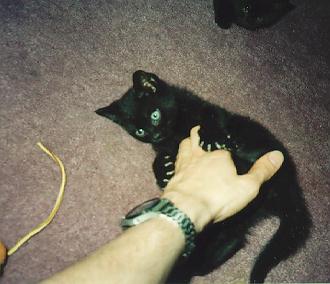So I finished John Scalzi's The
Android's Dream last night. Here is my report.
Bottom line: it's a light, enjoyable SF romp that trades knowingly
in SF tropes and conventions and flirts with cliché in places
without going over the line. It's fun. I enjoyed it.
It's not as meaty or as lean (to aim my metaphors in different
directions) as Scalzi's earlier novels, Old Man's War or The
Ghost Brigades. It feels less "worn smooth", which has its
positives (energy and exuberance) and negatives (a feeling that the
book could have been pared down by 10 or so pages, mostly in the
beginning).
There are some astonishingly funny bits in the book (though it's
not a comedy as such), as well as some pretty serious stuff, but
overall it's light and fun.
My issues with it are somewhat nebulous -- it's hard to tell how
much of them are me as a reader being my particular and peculiar self,
and how much are "in the book", with others seeing the same thing.
For instance, the book opens (with an interstellar fart joke, no less)
with an entire chapter about Dirk Moeller, who then proceeds to not be
in the rest of the book (for reasons which are obvious once you read
it). I spent Chapter 1 getting into the mode of "Okay, Dirk Moeller
is the protagonist, here's his backstory, and here's his setup, and
whooops! there he goes."
Then we have another chapter where we get another set of potential
protagonists (whose goals are in opposition to Dirk Moeller's), and
then I'm all, like, "ohmygod, who am I going to root for?".
And then, only in chapter 3 do we meet the person who turns
out to be our real protagonist (Harry Creek).
I feel like Chapter 1 should have been labelled "Prologue", and
(part of) Chapter 3 should have been Chapter 1, and Chapter 2 could
stay where it is, and the rest of Chapter 3 could be Chapter 3.
Now, this whole "who is our protagonist" theme could be considered
auctorially interesting, and anyone who knows me knows that while I
like nice linear storytelling, I also like weird time-slicing and
multiple viewpoint stories as well. But what I really like is knowing
who to root for, even if it's more than one person and they're against
each other. (This is one of the reasons I hate so much of the
"adultery in the suburbs" genre -- everyone is loathesome, so why
bother?)
The other thing that really struck me -- forcefully, which is
somewhat remarkable since I'm usually a fairly inattentive reader on
these sorts of things -- is that until we meet Robin Baker (the other
main protagonist), on page 116, there are basically no female
characters. I think someone's mother is mentioned (possibly by name),
and there's a short bit with a farmer whose wife (who we don't
actually see) really doesn't like to be woken up -- but that's
it. We see chunks of the US State Department, and of the US Defense
Department, but there's not a woman in sight until Robin shows up --
and barely any other than her, after.
This is especially bizarre given the number of strong female
characters in Old Man's War and The Ghost Brigades. Now
granted, a lot of the secondary characters in The Android's
Dream are criminals or military, or nerds, which as subsets of
humanity, tend to the testosterone-heavy. And Scalzi is on record as
explicitly mentioning
Elmore Leonard as an inspiration. But still. It's somewhat weird.
Or maybe I'm weird.
And there are a couple of sequences which violate my cardinal rule
of technological extrapolation: don't do details, because they'll
almost certainly be wrong. (If you can extrapolate technology and get
it right, then you might want to think about designing new gadgets and
user interfaces and building the tech, not writing SF!) The positive
version of this rule states that tech details should be left as vague
as possible, so things don't date too badly. (Nothing dates as
badly as last year's consumer user interface.[1])
The last bit of ranting I'll do is about a major (and nearly
literal) deus ex machina that is threaded throughout the book.
There's a long rant about how arrogant AI people are (which is true),
which concludes with the "obvious" way to make an AI (copying an
existing brain), which no one (in the book) has thought of. Well,
it's a great deus ex machina as it's written, but it's also
silly to posit a SFnal world where no one has thought of this, since
in our world, lots of people have thought about how to upload their
brains into computer simulations. Clearly The Android's Dream
exists in a parallel universe where Ray Kurzweil, Greg Egan, and a
bunch of other people (including Frederick Pohl, who "vastened"
Gateway's Rob Broadhead in Heechee Rendezvous all the
way back in 1984) never existed. What I really wish Scalzi had done
was explain that lots of people had tried this, but no one had
succeeded, and then explain how clever this particular uploaded AI's
uploader was.
What can I say? I'm a science and computer geek. Things like this
bug me.
Wow, I just spent ten paragraphs criticizing a book I really
enjoyed reading. What's up with that? Well, if John Scalzi is
interested in a nitpicking science and computer geek to help keep him
out of trouble, he can consider this my audition. (Yeah, like he's
going to be reading this.)
Or maybe I'm simply still annoyed at him for linking to this, which (as I
mentioned a few posts ago), has eaten up way too much of my time.
Damn you, Scalzi!
[1] Some notable non-consumer interfaces, like
good command
line interfaces, age very well indeed.




